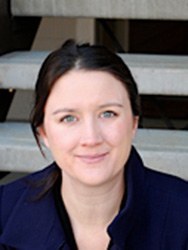Congratulations to Saskia Neher, Assistant Professor of Biochemistry and Biophysics who received a Basic Science Award from the National Lipid Association (NLA)!

The purpose of the NLA Inaugural Junior Faculty Research Award is to encourage scholarly advancement of junior faculty in the pursuit of a career related to hyperlipidemia and other lipid disorders in humans. To support their research, each awardee’s research institution will receive $70,000 per year for two years’ salary support. Both awardees are expected to submit a scientific manuscript based on their research conducted within one year of the end of the two-year term to the Journal of Clinical Lipidology for publication.
The National Lipid Association (NLA) announced on June 15, 2017 the recipients of its inaugural Junior Faculty Research Awards for Clinical Science and Basic Science.
Saskia Neher, Ph.D., currently an Assistant Professor of Biochemistry and Biophysics at the University of North Carolina, Chapel Hill, was the recipient of the Basic Science Award. Amit Khera, M.D., a cardiologist and physician-scientist at Massachusetts General Hospital, Harvard Medical School and the Broad Institute of Harvard and MIT, was selected as the Clinical Science Award winner.
“Both these young researchers have a track record of high productivity in scientific discovery and publication,” said W. Virgil Brown, M.D., who served as Chair of the NLA Junior Faculty Award Selection Committee. “They are working on areas of importance to the fundamental understanding of lipid metabolism that will certainly have relevance to clinical lipid disorders.”
Neher’s winning proposal, “Lipases and Beyond: Novel Substrates for LMF1,” aims to understand the full impact of LMF1, which helps to fold LPL, the main lipase that clears triglycerides from the blood. Neher’s lab identified novel LMF1 clients that have roles in regulation of LDL cholesterol and thrombus stability. Neher and her team seek to understand what happens when LMF1 is missing and how it impacts human health.
“I am deeply honored to be selected for the NLA’s Junior Faculty Basic Science Award,” Neher said. “This award will have a great impact on my research program. It not only provides financial support but also provides excellent exposure for my group’s exciting research. Our work has certainly been challenging, and I am grateful to the hard-working scientists in my lab who make it possible.”
“We are extremely pleased to have a part in assuring that their opportunity to continue this exciting research will be enhanced by the programs of the National Lipid Association,” Brown said. “In addition, their presence on the faculty of their respective institutions will add to the academic instruction and provide inspiration to younger students of science that may multiply the number of those entering fields related to lipid metabolism. Their discoveries and their examples are extremely important to the NLA as the basis of growth in fundamental understanding of the approaches likely to be successful in improving the practice of clinical lipidology.”
To be eligible for a Junior Faculty Research Award, an applicant is expected to hold or be eligible for a doctoral-level degree (Ph.D., Pharm.D. or M.D.) before the date of the scheduled award. Applicants must be a faculty member as an assistant or associate professor at a qualifying institution with less than seven years of service and have a record of accomplishment in a relevant research area.
More information about the next NLA Junior Faculty Research Award cycle will be available in Fall 2017 on lipid.org.
Courtesy of Eric Scott of the National Lipid Association
